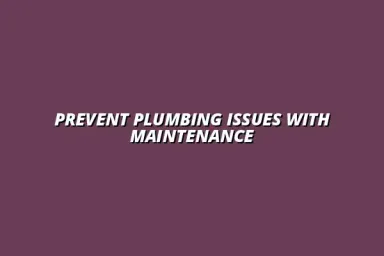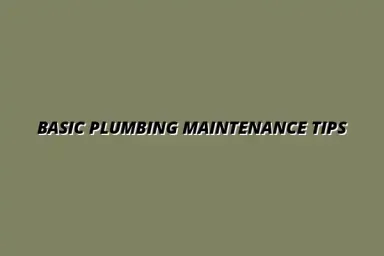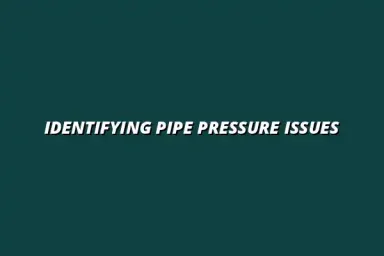Understanding Pipe Integrity: Key Indicators of Potential Issues
When it comes to maintaining a healthy plumbing system, understanding pipe integrity is crucial. The pipes in your home are not just hidden pathways for water; they are essential for your daily activities. Recognizing the key indicators of potential issues early can save you from significant headaches down the line!
It's important to monitor the condition of your plumbing system regularly. By being aware of the signs of deterioration, you can take action before small issues escalate into major problems. Let’s dive into why regular inspections and awareness of symptoms are so vital. For example, understanding how to essential bathroom plumbing checks can prevent many issues.
The Importance of Regular Plumbing Inspections
Regular plumbing inspections play a pivotal role in ensuring your system's longevity. By having a professional examine your pipes periodically, you can identify vulnerabilities that may not be visible to the naked eye. This proactive approach helps maintain the health of your plumbing and prevents unexpected breakdowns!
Moreover, these inspections can enhance the efficiency of your plumbing. A well-maintained system allows you to save on utility bills and prevents the hassle of inconvenient repairs. Regular maintenance is key to maintain plumbing to prevent repairs, saving you money in the long run. It's a win-win situation for homeowners looking for peace of mind.
- Detects potential issues before they escalate
- Increases the lifespan of your plumbing system
- Improves overall efficiency and reduces costs
Enhancing Longevity of Your Plumbing System
Regular maintenance not only extends the life of your pipes but also enhances the performance of your plumbing system. When pipes are in good condition, they work efficiently, ensuring that water flows smoothly throughout your home. This smooth operation means fewer disruptions to your daily life!
Furthermore, the materials used in your plumbing can degrade over time. Regular inspections allow professionals to assess these materials and recommend necessary upgrades. This proactive measure will keep your home safe and functional. For instance, understanding the impact of old pipes and water pressure issues is crucial.
Avoiding Costly Emergencies through Early Detection
By identifying potential problems early on, you can avoid costly emergencies that may arise from neglected pipes. Imagine waking up to a burst pipe that floods your basement! Regular inspections can help you dodge such disasters.
It’s also important to remember that timely detection can lead to less expensive repairs. Addressing minor issues before they turn into major concerns saves both time and money. In the long run, it’s always more economical to be proactive about your plumbing! Learn more about signs your plumbing needs attention.
Common Symptoms Indicating Pipe Problems
Your plumbing system may send out warning signs that something isn’t right. Recognizing these symptoms early can help you take the necessary steps to address any issues. Let’s explore some common indicators that might suggest your pipes are experiencing problems.
By staying alert to these signs, you can maintain the integrity of your plumbing system and avoid future complications. Here’s what to look out for!
- Unusual sounds coming from your pipes
- Changes in water pressure
- Water discoloration and odors
- Visible signs of leakage or dampness
Identifying Unusual Sounds Coming from Your Pipes
One of the first signs that something might be wrong with your plumbing is unusual sounds. If you hear banging, gurgling, or hissing noises, your pipes could be trying to tell you something! These sounds often indicate air in the pipes or issues with water flow.
Ignoring these noises might lead to bigger problems like leaks or breakages. Addressing them early can save you a lot of stress and money in the long run. Don’t overlook those strange sounds!
Recognizing Changes in Water Pressure
Have you noticed a decrease in water pressure when you turn on the faucet? This could signify a problem with your pipes. Low water pressure can result from clogs, leaks, or even corrosion within your plumbing. It’s essential to investigate these changes!
Increased water pressure can also be an issue, leading to stress on your pipes and fixtures. Keeping an eye on water pressure can help maintain a healthy plumbing system. Don't hesitate to call a professional if you notice any unusual changes! Finding and detecting hidden pipe leaks at home can be challenging.
Detecting Water Discoloration and Odors
If your water appears discolored or has an unusual odor, it’s time to take action! Discolored water can indicate rust or other contaminants in your pipes. Not only is this an unpleasant experience, but it may also pose health risks.
Additionally, foul smells can suggest the presence of sewage or stagnant water. These are serious issues that require immediate attention. Keeping your water clean and safe is a priority!
Observing Visible Signs of Leakage or Dampness
Finally, visible signs of leaks or dampness around your home should never be ignored. Puddles of water, wet spots on walls or ceilings, and mold growth are all red flags! These signs indicate that you may have a leak somewhere in your plumbing system.
Addressing these visible issues promptly can prevent more severe damage to your home and health. Always keep an eye out for damp areas and address them quickly! If you need help with a leaking water heater, check out this guide on repairing a leaking water heater pipe.
Making Informed Decisions for Your Plumbing Needs
When it comes to maintaining the health of your plumbing system, making informed decisions is crucial. By understanding the signs of potential issues and having a plan, you can ensure your system operates smoothly. This knowledge empowers you to take the necessary steps to either repair or replace your plumbing, ensuring a safe and healthy environment.
Connecting with a professional plumber can also provide valuable insights. Their expertise can guide you through the maze of plumbing issues, making the decision-making process much simpler. For example, a plumber in Billesley, Birmingham can be found at this link.
Consulting with Professional Plumbers
Reaching out to expert plumbers can be one of the best steps you take for your plumbing needs. Professional opinions can help you understand the condition of your pipes and recommend the best course of action. Their experience often means they can spot problems that a layperson might miss.
- Access to specialized tools and techniques
- Knowledge of current plumbing codes and standards
- Ability to provide a variety of solutions for your specific situation
The Benefits of Seeking Expert Opinions
There are several advantages to consulting with professional plumbers. First, they can provide a detailed assessment of your plumbing system. Second, they often know the best materials and methods for repairs or replacements that will last longer.
By getting a second opinion, you may also discover affordable solutions that you weren't aware of, saving you both time and money in the long run!
Understanding Estimates and Recommendations
When you receive estimates from plumbers, it’s essential to understand what’s included. These documents should outline the cost of labor, materials, and any additional fees. Knowing the breakdown can help you compare different plumbers and make an informed choice.
Also, don’t hesitate to ask questions! Understanding the recommendations can provide clarity on what needs to be done and why certain options are suggested.
Steps to Take if You Suspect Pipe Issues
If you think there might be a problem with your pipes, taking immediate action is key. Here are a few steps you can follow to assess and address any potential issues:
- Listen for unusual sounds like gurgling or hissing.
- Check for any visible leaks or damp spots around walls and ceilings.
- Monitor your water pressure and look for any sudden changes.
- Inspect your water for discoloration or strange odors.
Conducting a Personal Assessment of Your Plumbing
Before you call in the professionals, you can conduct a personal assessment of your plumbing system. Start by checking for any visible signs of wear or damage around fixtures and pipes. Additionally, take note of any unusual behavior, such as slow drains or frequent clogs.
These observations can provide professional plumbers with helpful context when they arrive, making their job easier and potentially speeding up repairs!
When to Schedule a Professional Inspection
It's wise to schedule a professional inspection under certain circumstances. If you notice persistent leaks, unusual noises, or any signs of corrosion, these are good indicators that it’s time to call an expert. Additionally, you should consider having your plumbing inspected if your home is older and hasn't had an assessment in a while.
Regular inspections can also help catch problems before they escalate into major issues, saving you both stress and money in the long run!
Long-Term Considerations for Plumbing Maintenance
Maintaining a healthy plumbing system requires ongoing attention. Regular check-ups can go a long way in preventing unexpected issues down the line. By considering long-term maintenance, you can help prolong the life of your plumbing and avoid costly repairs.
Keeping track of your plumbing system's condition can help you understand when repairs or replacements might be necessary, ensuring your plumbing remains functional and trustworthy.
The Importance of Regular Maintenance Checks
Regular maintenance checks are essential for keeping your plumbing system in top shape. Scheduling routine inspections can help identify minor issues before they escalate into major problems. Here are some preventive measures that can enhance the longevity of your pipes:
- Regularly clean drains to prevent clogs.
- Inspect and replace worn-out washers and seals.
- Flush your water heater annually to remove sediment buildup.
Implementing Preventive Measures to Avoid Future Issues
Implementing preventive measures can significantly reduce the chances of plumbing disasters. Simple actions like being mindful of what goes down the drain or regularly checking for leaks can save you from significant headaches later. Regular maintenance helps ensure that any potential issues are caught early, making it easier and less expensive to address them.
Moreover, developing a routine maintenance schedule can keep your plumbing system running smoothly and efficiently!
Understanding the Lifespan of Different Pipe Materials
Different pipe materials have varying lifespans, which is crucial to consider in maintenance planning. For example:
- Polyvinyl chloride (PVC) pipes can last over 100 years.
- Copper pipes generally last 70-100 years.
- Galvanized steel pipes may need replacement after around 20 years.
Being aware of these lifespans helps you anticipate when replacements may be needed, ensuring you stay ahead of potential plumbing issues!
Final Thoughts on Pipe Health Management
Balancing cost and quality in plumbing solutions is vital for effective pipe health management. When you invest in good-quality materials and expert services, you are likely to see long-term benefits. It’s essential to weigh immediate costs against future savings when making decisions about repairs or replacements.
Encouraging a proactive stance on plumbing care can help you maintain a healthy system. Regular inspections and prompt action on issues will keep your plumbing in top-notch condition for years to come!

 Kiran Almasi
Kiran Almasi

